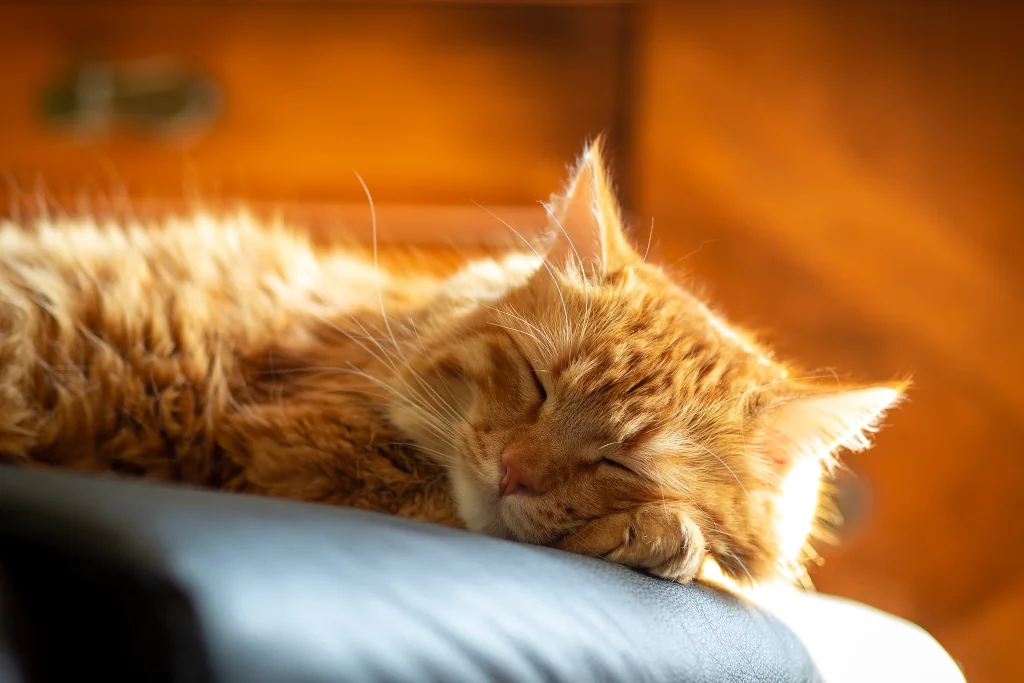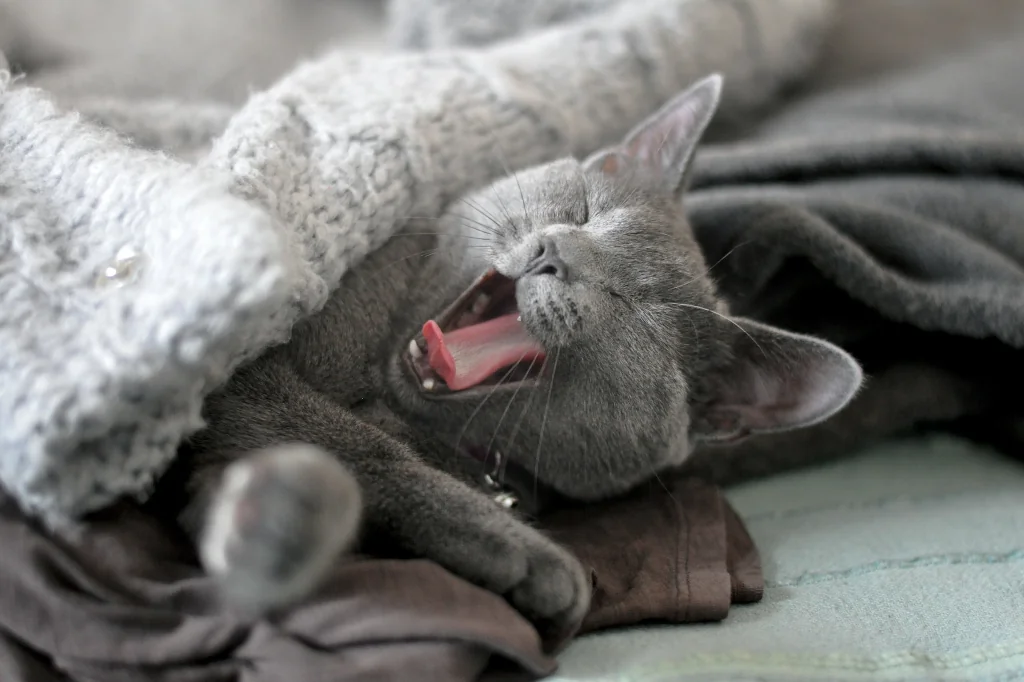Disclosure: We may earn a commission from helpful, relevant links in our content. No cost to you. See our privacy policy.
Everyone loves a good cat nap, especially our feline friends. But when your kitty’s snoozing stretches from hours into half-day marathons, it’s natural to wonder if such lethargy is more than just adorable laziness. Why are cats so lazy?
Still, one might be left wondering about the fine line between a ‘catnap’ and ‘catatonia.’
This blog post aims to shed some light on those long hours of feline idleness and help you discern between normal cat behavior and possible health concerns.

Is Your Cat’s Laziness Normal?
Laziness in cats is not only normal but quite common.
Cats are crepuscular creatures, meaning their peak activity occurs during dawn and dusk. The rest of the time is mostly spent lounging and napping. Yet, every cat is different, and what might seem lazy for one could be normal for another.
Pay attention to your cat’s regular habits. An unusual increase in inactivity, loss of interest in play, or drastic changes in behavior might require a vet’s attention.
Why Do Cats Sleep So Much?
Now you may ask, “Why do cats sleep so much anyway?” It all goes back to their wild ancestors, who were predators needing to conserve energy for hunting.
Even though our modern house cats aren’t chasing down prey in the wild, the genetic trait for lengthy sleep endures. Picture it this way – it’s like your tabby’s carrying around a little ancestral baggage, only this baggage is full of Zs and happens to be really, really cute!
But be warned, a sudden increase in sleep time or lethargy can also be signs of potential health issues.
So, while it’s entertaining to joke about lazy cats, as a cat parent, always stay alert to shifts in your pet’s regular sleep patterns.
Trust me, Smokey, my male cat, once turned his nose up at his favorite tuna treat due to a sudden bout of lethargy, and a quick vet visit revealed he was coming down with a fever. Keeping an eye out for such subtle changes can make all the difference.
How to Tell if Your Cat Is Lazy or Sick?
Both of these can display similar symptoms, but the key lies in observing changes in behavior. While it’s normal for cats to sleep up to 16 hours a day, sudden increases in sleep or lethargy should raise concerns.
Watch out for signs of decreased appetite, unexplained weight loss, or changes in grooming habits. Cats are notorious for hiding discomfort, so a cat that appears ‘lazier’ than usual might actually be in pain or feeling unwell.
Notice if your cat is less interested in playtime or doesn’t react to things that usually excite them. If your usually lazy cat is more lethargic and displays any of these symptoms, a vet check-up is in order.
Early detection is key in managing many feline health issues.
BTW, if you’re looking to change a vet, we have a great guide here on choosing the right vet for you, with lots of great tips.

Why So Lazy? Comparing Cats and Dogs
Comparing the activity levels of cats and dogs is like comparing apples to oranges – they’re fundamentally different species with distinct behaviors.
Dogs are social pack animals, bred for various tasks over thousands of years, leading to breeds that often need physical activity and mental stimulation. On the other hand, cats are solitary hunters that expended bursts of energy in the wild to catch their prey and then rested to conserve energy.
This difference in evolutionary roles has led to dogs typically being more active and interactive than cats.
But that doesn’t make cats lazy – it’s simply a different, more relaxed lifestyle that’s been passed down through generations of feline evolution.
Just like how some people are more laid-back while others are always on the go, cats and dogs have their unique behavioral traits – and that’s what makes them fascinating!
When Do Cats Need Exercise, and How Much?
While our feline friends might seem to be masters of relaxation, it’s crucial they also get their daily dose of exercise. Regular activity not only keeps your cat physically fit but also provides mental stimulation, crucial for overall well-being.
The best time to engage your cat in play is during their natural “hunting” times, typically in the early morning or late evening when their wild ancestors would have been most active. But remember, each cat is unique, and their playtime preference might differ.
As for how much exercise, aim for about 15-20 minutes of active play each day. You can break this up into multiple short sessions if your cat is older or less active.
Use toys that simulate hunting – think toy mice, laser pointers, or feather wands. Make sure you let your cat ‘catch’ their prey now and then to avoid frustration!
Feline Fitness: The Purr-fect Balance
So, whether your cat is a natural couch potato or a high-energy hunter, remember it’s all about balance. Understand their behavior, provide them with the right amount of exercise, and keep an eye out for changes that could indicate health issues.
Don’t forget to relish the calm, quiet moments with your feline friend – after all, who doesn’t enjoy a good lazy afternoon now and then?
FAQs
Does a cat’s breed influence how active it is?
Absolutely. Certain breeds like the Bengal or Abyssinian are known for their high energy levels, while others such as the Persian are typically more relaxed. But remember, individual personalities can vary widely within a breed.
How many hours a day do cats typically sleep?
Cats typically sleep between 12 to 16 hours a day, though kittens and senior cats often sleep even more, up to 20 hours, due to growth needs and slower metabolism respectively.
What are some signs my cat might be too inactive?
Signs of inactivity in a cat can include sudden weight gain, decreased interest in play, lethargy, and changes in eating or grooming habits.
Could there be a health issue if my cat is extremely lazy?
Yes, while cats are typically laid-back, excessive laziness can indicate health problems such as obesity, arthritis, or other underlying medical conditions. If your cat’s lethargy is paired with any other unusual behaviors, it’s best to consult a vet.
Alex, a passionate animal lover, has experience in training and understanding animal behavior. As a proud pet parent to two dogs and three cats, he founded AnimalReport.net to share insights from animal experts and expand his knowledge of the animal kingdom.




